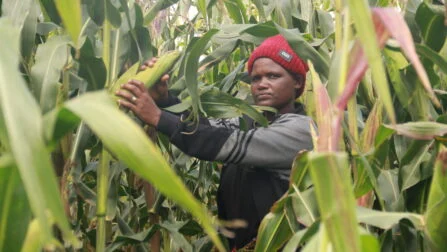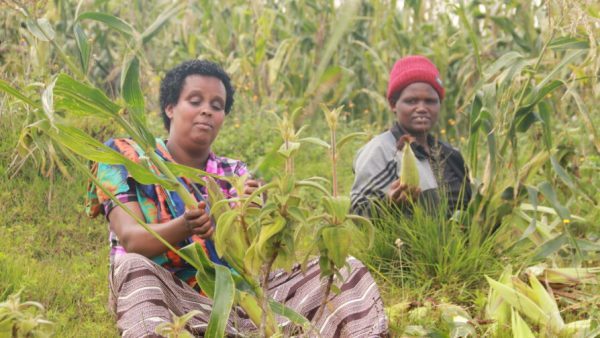
Iribagiza Nakabonye (right) and one of her colleagues in a maize farm run by Best Future Women Company. © Community Social Media Influencers in Kiziba Refugee Camp
Growing up in Kiziba Refugee Camp, Iribagiza Nakabonye and her family from the Democratic Republic of Congo were heavily relying on humanitarian assistance to meet their basic needs. Now, the 40-year-old woman who has been living in the camp since 1996, is inspiring self-reliance among the refugees and host communities through farming and selling foodstuffs.“Venturing into small businesses has significantly changed my life,” Nakabonye says. “I no longer depend on humanitarian assistance. I am a proud entrepreneur whose activities benefit not only my family but also other refugees and our host community.”
At Kiziba refugee camp, located in Karongi District in the western part of Rwanda, the mother of seven works together with other four refugee women at ‘Best Future Women Company’, a venture they established a few years ago. They run a restaurant in the refugee camp and do farming activities in the neighbouring community as well.
Their company supplies foods and beverages for various events and activities in the camp. They have also been growing maize and Irish potatoes over the last six years, on more than 3 hectares of land they leased.
“We produce what we eat, but also generate income through selling the surplus of our agricultural produce and supplying food and drinks,” Nakabonye says.
As an example of how profitable their business is, Nakabonye says that in March and April 2021, Best Future Women Company secured a tender to supply lunch, snacks, and beverages, banking Frw 8 million (8000 USD) profit in just two months.

Iribagiza Nakabonye, one of the co-founders of ‘Best Future Women Company,’ in a maize farm run by refugee women living in Kiziba refugee camp. © Community Social Media Influencers in Kiziba Refugee Camp
“We invested Rwf 5 million (5000 USD) and registered a turnover of Rwf 13 million (13000 USD) through supplying foods and beverages in two months. That’s not bad for us,” Nakabonye proudly shares.
For Nakabonye and her associates, what they have been able to achieve over the last six years is an exemplar of evidence of what can be possible for refugees to attain self-reliance. And they still have big ambitions to make their future brighter, despite being refugees.
“Our next step is to mobilize financial resources and buy a truck that will help us distribute our supplies across the country,” she adds.
According to the refugee women, the spirit of striving for self-reliance emerged after attending a training on self-reliance of refugees, through the support of UNHCR and Prison Fellowship Rwanda.
Since the company started working, it has created jobs, employing eight refugees who earn salaries monthly. It has also created an economy that benefits both the refugee and host communities.
Refugees and host community members running small businesses, selling vegetables, cooking oil, rice, and other products alike, in and around the camp, are the company’s important suppliers. Through purchasing from these vendors, the company’s initiative has contributed to the empowerment of women in the Kiziba camp, as they are enabled to also be self-reliant.
As part of their corporate social responsibility, the Best ‘Future Women Company’ has helped feed the most vulnerable households during the COVID-19 pandemic, through the umbrella of the Kiziba Refugee Women Committee.
They also play key role in promoting environmental protection and disaster risk reduction. The land in Karongi, where the Kiziba refugee camp is located is hilly and sloppy, and thus prone to soil erosion. Their farming activity, planting different crops in rotation, creating water channels and radical terraces are preventing landslides.
According to refugees at Kiziba camp, the women-led company is promoting livelihood initiatives and empowering the self-reliance of refugees within the camp. Some of the refugees are emulating their best practices to run their own small businesses and feed their families.
The impact of Nakabonye and her associates is remarkable in Kiziba refugee camp, and beyond, their resilience is an inspiration to the entire Kiziba community. (End).
Reporting by Community Social Media Influencers in Kiziba Refugee Camp. Community Social Media Influencers collect stories and take photos in their community. They also do awareness-raising campaigns to better protect the youths and adolescents in the camp.
Edited by Arum Cho & Eric Didier Karinganire.
